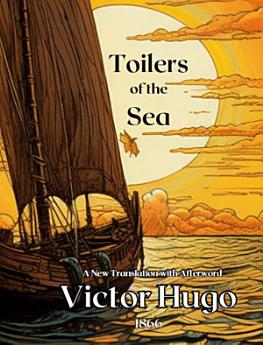Toilers of the Sea
About this ebook
When Toilers of the Sea (Les Travailleurs de la mer) was published in 1866, it was eagerly received by a public still reeling from the epic drama of Les Misérables four years earlier. Instead of the crowded streets of Paris, readers were now immersed in the brine and storm of a small maritime community. The novel’s dedication – “To the Island of Guernsey, noble little island where I have lived, small corner of land that I love, the great sea that surrounds you – to you I dedicate this book” – immediately signaled Hugo’s shift in focus. English critics were particularly charmed; here was France’s greatest novelist celebrating a corner of the British Isles, complete with English heroes and references to recent history like the Napoleonic Wars. Contemporary reviews praised the book’s descriptive power and its return to high adventure. And indeed, one scene became instantly famous: the protagonist’s life-or-death wrestling match with a giant octopus in an ocean cave. This gripping encounter – shocking and fantastical – gave Victorian readers much to talk about, and it still stands out as one of the most striking passages Hugo ever penned. Though Toilers of the Sea never attained the universal cultural impact of Les Misérables, it solidified Hugo’s reputation as a master storyteller who could set his tale in any milieu, whether grand city or isolated isle, and keep readers enthralled.
Historically, Toilers of the Sea also holds interest as part of Hugo’s so-called “exile trilogy,” alongside Les Misérables and later The Man Who Laughs. Writing far from mainland France, Hugo turned his creative eye to settings outside his usual Parisian milieu. In doing so, he widened the scope of French literature, bringing a global and maritime perspective that was relatively rare at the time. The novel introduced readers to the Channel Islands – a unique blend of French and English culture – and even today, visiting Guernsey with Hugo’s descriptions in hand can be a surreal experience, as so little has changed in the island’s rocky landscape. In the end, Toilers of the Sea stands as both a grand yarn and a heartfelt personal work. Its pages echo with the crashing of waves and the hammer of a determined man on a reef, but also with the unspoken truth that not all heroism is rewarded by worldly happiness. Victor Hugo’s island gift to posterity, this novel remains a stirring read for anyone who has ever stood at an ocean’s edge and felt humbled by its majesty, yet resolved to wrest something meaningful from its depths.
This critical reader's edition presents a modern translation of the original manuscript, crafted to help the armchair philosopher engage deeply with Victor Hugo's works through clean, contemporary language and streamlined syntax that clarifies his expansive ideas. Additonal material enriches the text with autobiographical, historical, and linguistic context, including an afterword by the translator on Hugo’s history, impact, and intellectual legacy, an index of the themes and philosophical concepts he employs—emphasizing Romanticism, social justice, and moral idealism—a comprehensive chronological list of his published writings, and a detailed timeline of his life, highlighting the personal relationships (including his relationship with Dickens) and political commitments that shaped his vision.










